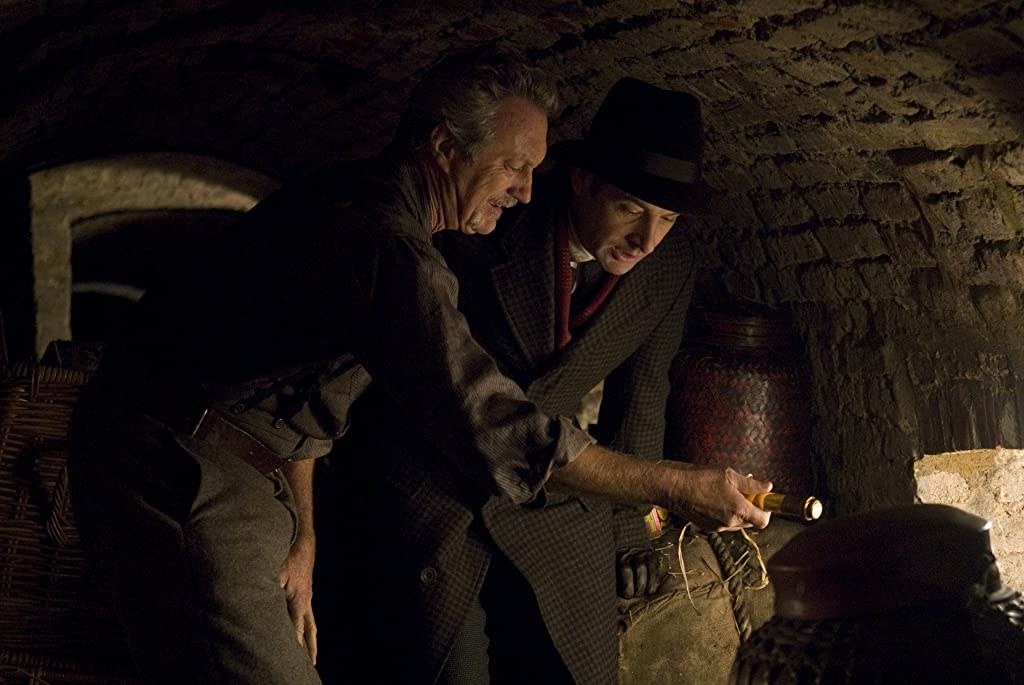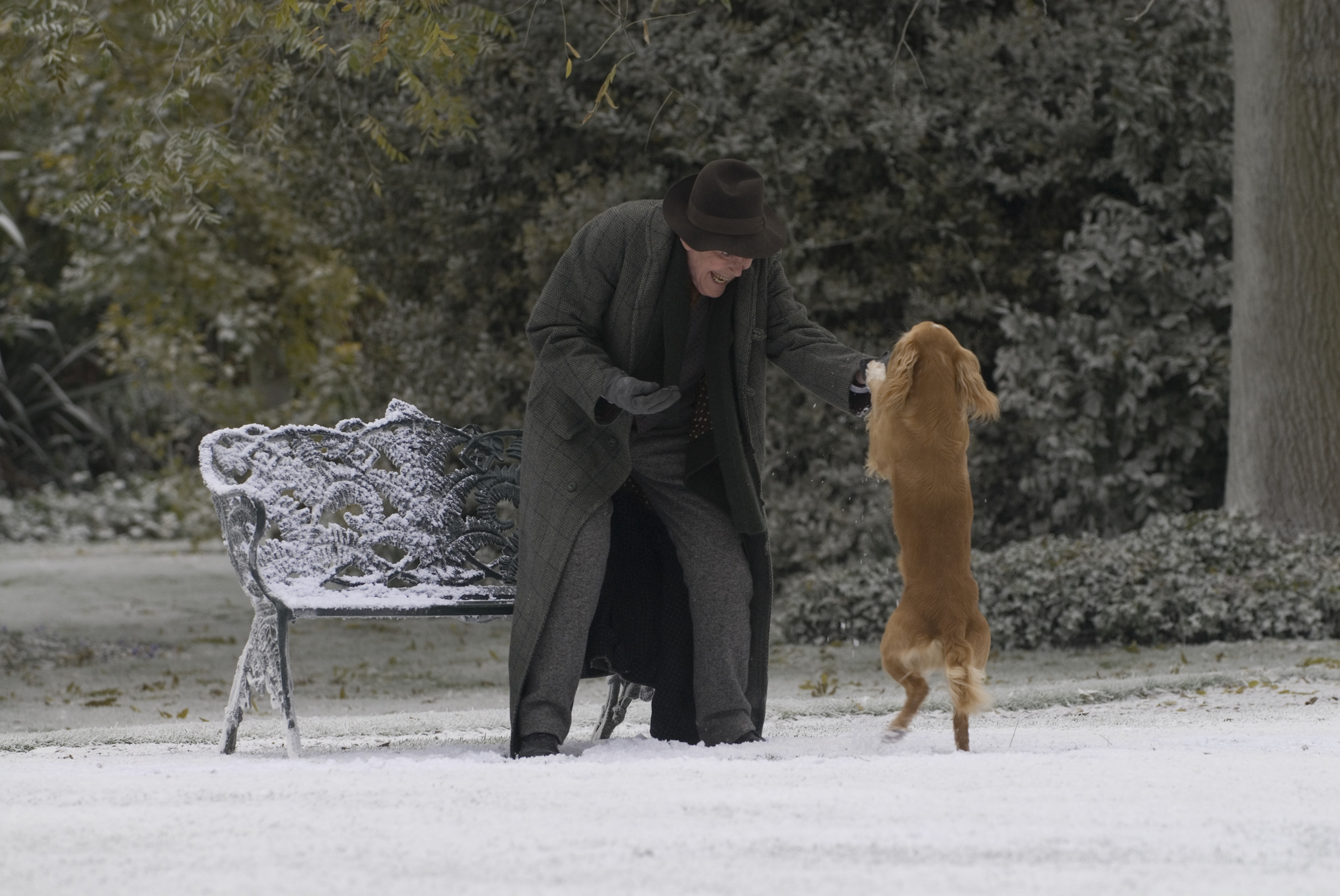This review contains discussions of death and trauma.
I’ve written this review countless times in my head over the years since my first viewing of Toa Fraser’s Dean Spanley. I’ve ruminated on the scenes of a tipsy Dean Spanley regaling stories about his previous life as a dog, and each time I recall the wistful, ponderous gaze of Sam Neill, I get a little misty eyed.
It’s 1904 in England, and Fisk Jr. (Jeremy Northam) is growing tired of the routine and static visits he makes to his father, Horatio Fisk (Peter O’Toole). Fisk Sr. is your atypical grumpy old man. His twilight years are upon him, and as such, a stubborn routine has cemented itself into his existence. At his behest, his dutiful live-in maid Mrs Brimley (Judy Parfitt) tends to his daily life, making the same old stodgy stew day in, day out, while also ironing the daily newspaper.
Fisk Sr. would read the newspaper almost completely, avoiding the obituaries for fear of coming across his own name. While one day discussing the meaning of this with Mrs Brimley, Fisk Jr. notices an advertisement for a seminar on reincarnation, titled ‘The Transmigration of Souls’, run by Swami Nala Prash (Art Malik). Upon hearing about the seminar, Fisk Sr. remarks, ‘think if we had souls they wouldn’t get in touch? Of course they would! Think your mother wouldn’t be on to me about that garden? Of course she would!’ The close minded state of Fisk Sr. is given enough rope to hang itself without the film criticising the archaic mindsets of these older Brits for us.
Held in a cavernous estate where the parlour room has been transformed into a cricket pitch, the seminar entices the likes of Fisk Jr., his father, Dean Spanley, a rag-tag conveyancer named Wrather (Bryan Brown), and a couple of women who have arrived to ask questions about cats. The Swami responds to their remarks about cats having souls as unlikely, stating that a dog is more likely to carry on as ‘the dog amplifies, the cat diminishes man’s estimation of himself’.
With Fisk Sr. dozing off during the seminar, startling himself awake at its conclusion, just in time to hear the Swami mention the ‘ante-room of eternity’, a guiding reference to the current life we all live. This notion immediately evokes a response of ‘poppycock!’ from Fisk Sr., but it’s one that he struggles to evade for the rest of the film.
I first saw Dean Spanley on its initial release at Perth’s now defunct Cinema Paradiso in Northbridge. I was alone in the theatre, something which as the film came to a close I was supremely grateful for. I didn’t expect much going in except maybe a routine Brit-flick about stuffy old white men badgering on about the ‘colonies’ and the occasional moment of xenophobia, and while that certainly is an appendage to the plot of Dean Spanley, it’s not the core thrust of the narrative.
Sure, there is a subtle assessment of the role of colonial England and its taut ties to India, Africa and other countries it’s noxiously exploited through wars or brute force dominance. There are quietly damning lines that open colonial England up for scrutiny, ‘it’s important for the English race that we are loved by those we rule’, but the interest in that kind of critique is not paramount for the film. The same can be said of the use of foreign culture and food to enlighten white minds, especially given Fisk Sr.’s statement of the ‘certainty of a closed mind’. While that is an avenue that does need to be explored and discussed in relation to Dean Spanley, the focus of the film, and of this review, is more towards the canine persuasion.
Fisk Sr.’s life is draped with loss and grief, with his wife having passed, and his son being lost during the Boer War. A lingering sadness over the disappearance of his childhood dog, Wags, weighs heavily on Fisk Sr.’s mind. For Fisk Sr., he did his part with staving off the death of his son, having remarked to him that the Boer War would be ‘bad for his health’, and as such, he treats the death of his son as if it only pertains to him and him alone. The death is not personal, for it did not happen to him. Fisk Jr. throws a barb at his father, stating that this insolence and obnoxious behaviour likely ferried his mother off to an early grave, with her having had to carry the weight of grief all by herself. Fisk Sr. strikes back with a simmering anguish and heartbreak that hides behind a stoic facade.

A demand to open oneself up to the pain of loss is to invite a reflection of that loss on those it is evoked upon. ‘When something has gone to the effort of happening, it’s best to accept the inevitable,’ is Fisk Sr.’s dismissive report of grief and loss. Why bother spending your time ruminating on what is lost when it is already gone? Yet, to do so is to neglect the importance and value that the soul had on your life. To delegate their death as being the fault of their own is a powerfully reductive belief, one that is not simply contained by the fictional character of Fisk Sr.
Grief strikes us all differently. While Dean Spanley is a film that predominantly operates within the realm of light comedy, it does so with a powerful meditation on the resonance of grief across a lifetime. Fisk Sr.’s reluctance to reconcile with the deaths that span his life could easily be seen as the semblance of a generation of men who refuse to accept or acknowledge the emotional side of death, let alone the emotional aspects of themselves, but intergenerational failure to acknowledge or discuss aspects of death and dying has created pockets of society where death is only discussed once it is too late. In fact, the persistence of death being the final taboo is a reality that is being shaken out of its stupor by the persisting pandemic that is transforming our world at large.
Embracing the ‘eternal now’ at a men’s club post seminar, the father and son duo encounter Dean Spanley once again, himself enjoying a casual glass of the rare Hungarian sweet wine, Imperial Tokay. There is no subtlety here, with the allusion that Dean Spanley is a dog reincarnated as a man being laid out bare from the opening, and the imminent suggestion that Fisk Sr. was once his master. Fisk Sr. refers to Dean Spanley as ‘the dog collar’, remarking on his observed absurdity of a man of faith entertaining himself with the notion of reincarnation and the afterlife.
It’s here that the devilishly delightful performance of Sam Neill is allowed to thrive and flourish, with Fisk Jr. encountering the Dean for the third time in the same day, a matter which he recognises is more than a coincidence. A cat has ferried itself up a tree, refusing to come down, and Dean Spanley awaits with great fervour for it to come down. Fisk Jr. enquires about the Dean’s antics, at which he scoffs at their eager obstinance, stating that ‘a cat does not know how to play the game’, with them merely running away at a sight of a dog. Later, Spanley comments on the jovial nature of horses and sheep, both of whom understand the implicit role they play in the game of dog play.



